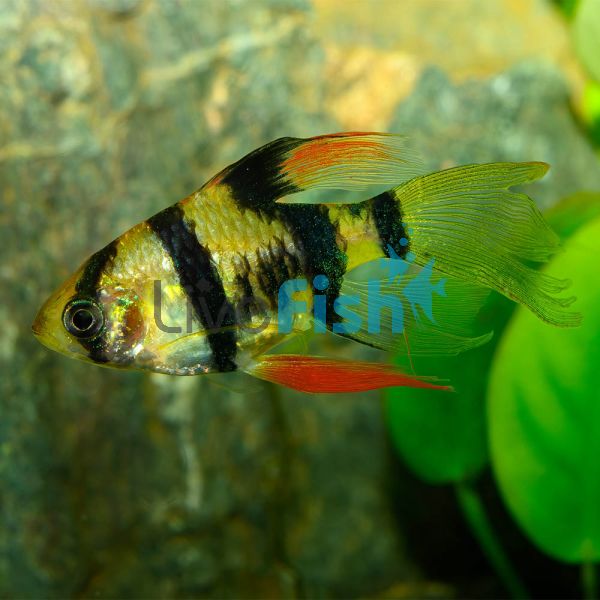Longfin Tiger Barb 4cm
Different colour variations of tiger barbs are coming into the aquarium hobby by complete surprise, what started as the humble orange and black fish now comes in gold, platinum, and even green. The art of captive breeding now allows for these unique genetic colour variations to be made however a real classic strain is the long-fin tiger barb. Aside from their beautiful contrasting colours and long flowing fins, the care requirements are the same as any of the other strains which means that you could totally have a jelly bean-type assortment of tiger barb colours in your aquarium.
- Buy 4 for $12.95 each and save 10%
- Buy 8 for $11.51 each and save 20%
Longfin Tiger Barb
Different colour variations of tiger barbs are coming into the aquarium hobby by complete surprise, what started as the humble orange and black fish now comes in gold, platinum, and even green. The art of captive breeding now allows for these unique genetic colour variations to be made however a real classic strain is the long-fin tiger barb. Aside from their beautiful contrasting colours and long flowing fins, the care requirements are the same as any of the other strains which means that you could totally have a jelly bean-type assortment of tiger barb colours in your aquarium.
The long-fin tiger barb is the same as its standard counterpart however they present the long-fin gene. This means that all the fins will be far more extended and can even be the same length as the body. Tiger barbs get their name from the classic orange and black patterning they have, orange body colour tends to be darkest near the back with a lighter hue near the belly. They also have patches of red through the fins and nose for some additional contrast. These vibrant fish would look stellar in a lush, green-planted aquarium. They will also have great schooling behaviour and get larger than most common tetras so just imagine a nice school of contrasting, long finned fish that shine under aquarium lights… well that is the long-fin tiger barb for you.
Tiger barbs are also somewhat easily bred in the home aquarium which is why there always seems to be a new and crazy colour variation of this species. Though there are no immediate visually distinguishing features between males and females, the key thing to note is that female tiger barbs are generally more plump in comparison to males. Females can be conditioned to develop eggs by feeding them some protein-rich foods like live brine shrimp. Females will then scatter eggs in the aquarium which males follow and fertilise, aquarists often breed these fish in dedicated aquariums with spacing mops that collect the eggs in their fibres.
Tank Recommendations for Long Fin Tiger Barb
Tiger barbs in general are very active fish so they do need an aquarium with a minimum volume of 60 litres. This can house a school of around 6 individual fish however a larger aquarium will always be better as long fin tiger barbs reach around 7 cm excluding the length of the tail fin. Since tiger barbs are a mid-water dwelling fish the substrate or hardscape choices are not of major concern. Giving them tall pieces of driftwood and plants they can swim around will look quite nice but a lot of creative liberty can be taken to highlight this fish.
Suitable Tank Buddies
Tiger barbs have developed to name to be fairly nippy aquarium fish which can damage the fins of other aquarium fish by constantly nipping at them. This is only an issue if one or two tiger barbs are kept or there is not enough space provided for the barbs along with other tank mates. These long-fin variants are at higher risk of being nipped by other fin-nipping species. If you are looking to be on the safer side, it would be best to avoid fish with slow-moving fish like discus or angelfish. Other than that longfin tiger barbs are a great active addiction to a tropical community aquarium.
Usually Compatible
Apistogramma, Corydoras, plecos, dwarf cichlids, larger body tetras, torpedo barbs, and a wide range of peaceful community aquarium fish that exceed 5-6 cm in size. Larger peaceful cichlids like Uaru or severums can also be considered.
Sometimes Compatible
Nano aquarium species such as endlers or guppies as well as neon tetras. Also larger semi-aggressive species such as convict cichlids, fire mouths, and kribensis. Also, fish with long flowing fins like angel fish or threadfin acaras.
Rarely Compatible
Larger cichlids such as oscars, jaguar cichlids, African cichlids, and shrimp.
Feeding your Long Fin Tiger Barbs
Long-fin tiger barbs like most common tropical aquarium fish are very easy to feed. They should be given a good quality, slow-sinking pellet or flake food. This should also be supplemented with frozen foods such as black worms, blood worms, or brine shrimp to bring out optimal health and colours in the fish.
| Scientific Name | Puntius Tetrazona |
|---|---|
| Care Level | Easy |
| Common Names | Longfin Tiger Barb |
| Diet | Omnivore |
| Fish Family | Cyprinidae |
| Lifespan (years) | 5 |
| Max. Length (cm) | 7 |
| Min. Tank Volume (l) | 60 |
| Origin | Indonesia |
| Reef Safe | Yes |
| Sociability | Peaceful |
| Venomous | No |
| Water Conditions | 24-26° C, pH 6.0 - 7.0 |
-
0Hi is this price for 1 tiger barb ?Read Detail
 Submited by: D Ng
Submited by: D Ng
 23 Oct 2020
23 Oct 2020
-
Hi , They are priced indiviually unless otherwise stated. (ie: 10x Assorted Tiger Barb) Here is a link to our 4cm Tiger Barb, we rarely sell the 5cm ones. https://livefish.com.au/tiger-barb-4cmAnswered by Admin on 09 Nov 2020
-
- 1




